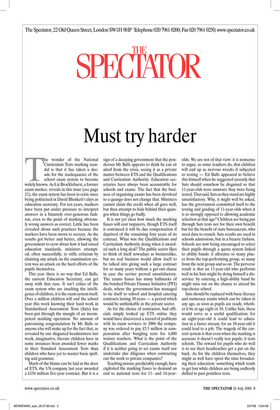Must try harder
The wonder of the National Curriculum Tests marking scandal is that it has taken a decade for the inadequacies of the school exam system to become widely known. As Liz Brocklehurst, a former exam marker, reveals in this issue (see page 21), the exam system has been in crisis since being politicised in David Blunkett’s days as education secretary. For ten years, markers have been put under pressure to interpret answers in a bizarrely over-generous fashion, even to the point of marking obviously wrong answers as correct. Little has been revealed about such practices because the markers have been sworn to secrecy. As the results got better and better, allowing the government to crow about how it had raised education standards, ministers attempted, often successfully, to stifle criticism by claiming any attack on the examination system was an attack on the hard efforts of the pupils themselves.
This year there is no way that Ed Balls, the current Education Secretary, can get away with that ruse. It isn’t critics of the exam system who are insulting the intelligence of children, it is the exam system itself. Over a million children will end the school year this week knowing their hard work in Standardised Assessment Tests (Sats) has been put through the mangle of an incompetent marking operation. No amount of patronising congratulation by Mr Balls or anyone else will make up for the fact that, as revealed by one disgusted headmistress last week, imaginative, literate children have in some instances been awarded fewer marks in their Standard Assessment Tests than children who have yet to master basic spelling and grammar.
Much of the blame can be laid at the door of ETS, the US company last year awarded a £156 million five-year contract. But it is a sign of a decaying government that the ponderous Mr Balls appears to think he can sit aloof from the crisis, seeing it as a private matter between ETS and the Qualifications and Curriculum Authority. Education secretaries have always been accountable for schools and exams. The fact that the business of organising exams has been devolved to a quango does not change that. Ministers cannot claim the credit when all goes well, but then attempt to hide behind their quangos when things go badly.
It is not yet clear how much the marking fiasco will cost taxpayers, though ETS itself is convinced it will be due compensation if deprived of the remaining four years of its contract. What was the Qualifications and Curriculum Authority doing when it awarded such a long deal? The public sector likes to think of itself nowadays as businesslike, but no real business would allow itself to be talked into giving such a large contract for so many years without a get-out clause in case the service proved unsatisfactory. The exams fiasco has many hallmarks of the botched Private Finance Initiative (PFI) deals, where the government has managed to tie itself to school and hospital catering contracts lasting 30 years — a period which would be unthinkable in the private sector.
As for the choice of contractor, had officials simply looked up ETS online they would have discovered a record of problems with its exam services: in 2006 the company was ordered to pay £5.5 million in compensation after bungling tests for 4,000 trainee teachers. What is the point of the Qualifications and Curriculum Authority if it is neither going to set exams itself nor undertake due diligence when contracting out the work to private companies?
Teaching unions, predictably enough, have exploited the marking fiasco to demand an end to national tests for 11and 14-year olds. We are not of that view: it is nonsense to argue, as some teachers do, that children will end up as nervous wrecks if subjected to testing — Ed Balls appeared to believe this himself when he suggested recently that Sats should somehow be disguised so that 11-year-olds were unaware they were being tested. That said, Sats as they stand are highly unsatisfactory. Why, it might well be asked, has the government committed itself to the testing and grading of 11-year-olds when it is so strongly opposed to allowing academic selection at that age? Children are being put through Sats tests not for their own benefit but for the benefit of state bureaucrats, who need data to crunch. Sats results are used in schools admissions, but in a bizarre fashion. Schools are now being encouraged to select their pupils through a quota system linked to ability bands: it allocates so many places from the top-performing group, so many from the next group and so on. The perverse result is that an 11-year-old who performs well in his Sats might be doing himself a disservice: by entering a high-ability band he might miss out on the chance to attend his top-choice school.
Sats should be replaced with basic literacy and numeracy exams which can be taken at any age, as soon as pupils are ready, whether it be at age eight or 18. Unlike Sats, these would serve as a useful qualification: for an eight-year-old it could lead to education in a faster stream; for an 18-year-old it could lead to a job. The tragedy of the current system is that even when the marking is accurate it doesn’t really test pupils; it tests schools. The reward for pupils who do well is to see their headteacher get a pat on the back. As for the children themselves, they might as well have spent the time broadening their education: something which tends to get lost while children are being endlessly drilled to pass pointless tests.


























































 Previous page
Previous page